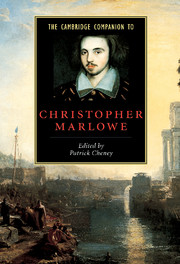Book contents
- Frontmatter
- 1 Introduction: Marlowe in the twenty-first century
- 2 Marlowe’s life
- 3 Marlovian texts and authorship
- 4 Marlowe and style
- 5 Marlowe and the politics of religion
- 6 Marlowe and the English literary scene
- 7 Marlowe’s poems and classicism
- 8 Tamburlaine the Great, Parts One and Two
- 9 The Jew of Malta
- 10 Edward II
- 11 Doctor Faustus
- 12 Dido, Queen of Carthage and The Massacre at Paris
- 13 Tragedy, patronage, and power
- 14 Geography and identity in Marlowe
- 15 Marlowe’s men and women
- 16 Marlowe in theatre and film
- 17 Marlowe’s reception and influence
- Reference Works
- Index
- Series list
- Plate section
7 - Marlowe’s poems and classicism
Published online by Cambridge University Press: 28 May 2006
- Frontmatter
- 1 Introduction: Marlowe in the twenty-first century
- 2 Marlowe’s life
- 3 Marlovian texts and authorship
- 4 Marlowe and style
- 5 Marlowe and the politics of religion
- 6 Marlowe and the English literary scene
- 7 Marlowe’s poems and classicism
- 8 Tamburlaine the Great, Parts One and Two
- 9 The Jew of Malta
- 10 Edward II
- 11 Doctor Faustus
- 12 Dido, Queen of Carthage and The Massacre at Paris
- 13 Tragedy, patronage, and power
- 14 Geography and identity in Marlowe
- 15 Marlowe’s men and women
- 16 Marlowe in theatre and film
- 17 Marlowe’s reception and influence
- Reference Works
- Index
- Series list
- Plate section
Summary
For modern readers perhaps nothing is more off-putting than the subject of classicism, with its unfortunate connotations of privilege and cultural exclusivity. In this chapter I want to show how classical culture spawns meanings, overturns ideas, amuses, shocks, and makes new in Marlowe's hands. It is far from dead, and neither does it necessarily work to confirm white, male privilege. The Renaissance had a more inclusive view of the classics than we do. Virgil, for example, was accepted as the author of the pseudo-Virgilian text known as Virgil's Gnat, so the arch poet of panegyric, the high priest of epic and imperial expansion, was also the author of a mockheroic trifle about an insect. The classical authors that Marlowe chose to translate and/or imitate in his poems, including Ovid, Lucan, Musaeus, and, in 'The Passionate Shepherd', Callimachus, were all recognized as dissident writers both by their contemporaries and by the Renaissance. Marlowe chose to identify himself with writers who, in various ways, resisted the political, moral, gender, and aesthetic ideals epitomized by Virgil's Aeneid, the text that has come to embody classicism for us. Our appreciation of Marlowe's poems is not only hampered by our narrow understanding of the classical ideal, we also prefer texts that confirm our values of individualism, distinction, and authenticity of voice. We denigrate texts, like Marlowe’s poems, which are translations or imitations because they supposedly lack originality, and conform to collaborative models of production which we are only just beginning to appreciate. We tend to agree with James VI, who once advised writers to avoid translation because it impairs one’s sovereignty: ‘ze are bound, as to a staik, to follow that buikis phrasis, quhilk ze translate’.
- Type
- Chapter
- Information
- The Cambridge Companion to Christopher Marlowe , pp. 106 - 126Publisher: Cambridge University PressPrint publication year: 2004



